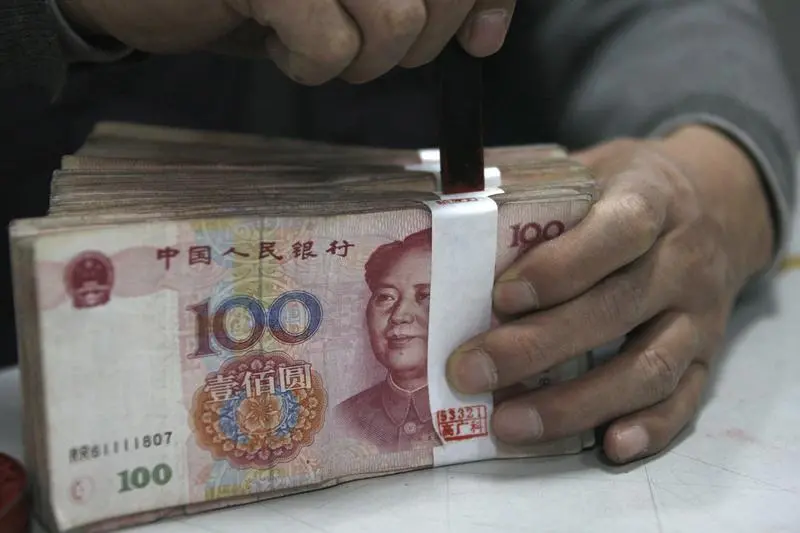PHOTO
By Karin Strohecker
LONDON, Jan 5 (Reuters) - Emerging currencies reversed strong early gains on Thursday that were driven by the yuan's surge to two-month highs against the dollar, though emerging stocks rose almost one percent after the U.S. Fed's tempered rate hike expectations.
Minutes of the Federal Reserve's December meeting released on Wednesday showed policymakers thought the world's largest economy could grow more quickly because of fiscal stimulus under President-elect Donald Trump's administration.
Yet they also highlighted concerns over policy uncertainty and the impact of a continuously rising dollar
.DXY
, prompting the greenback to retreat from its 14-year high
"The (U.S.) central bank is talking about the possibility of tightening further because of Trump's fiscal plan but at the same time there is some cautiousness in the minutes about what kind of plan he will be able to pass," said Murat Toprak, FX strategist at HSBC.
"The market has retained this pinch of salt as regards the outlook: There are too many uncertainties to draw a strong conclusion at this point."
MSCI's emerging market benchmark
.MSCIEF
rose 0.8 percent for their third day of gains, as Asian bourses chalked up healthy gains.
.HSI
.KLSE
.BSESN
.SSEC
.
The biggest moves were on China's yuan, with the offshore-traded currency surging to the highest in two months
CNH=D3
while hitting a one-month high onshore
CNY=
as overnight borrowing costs in Hong Kong jumped to almost 100 percent.
Beijing has stepped into both onshore and offshore yuan markets to shore up the faltering yuan this week amid speculation it wants a firm grip on the currency ahead of Trump's inauguration on Jan. 20.
Commerzbank analysts said the rise in the overnight rate meant that those shorting offshore yuan would face prohibitively expensive negative carry costs.
"We believe that the Chinese authorities want to deter the speculation in the offshore market via consciously raising the funding costs. However, the side effect is that the genuine business demand, such as trade, will be affected," they told clients.
The yuan was also helped by data showing China's services sector accelerated to a 17-month high in December.
Other currencies fared less well despite initial gains as investors remained focused on risks emanating from China.
South Africa's rand
ZAR=
weakened 0.5 percent against the dollar, after hitting its strongest level in four weeks in early trade when data showed the private sector continued to expand thanks to new orders and higher output.
Russia's rouble
RUB=
weakened 0.5 percent after hitting a 17-months high, mirroring oil
LCOc1
prices which retreated after an overnight bounce. (Additional reporting by Claire Milhench; Editing by Raissa Kasolowsky) ((karin.strohecker@thomsonreuters.com; +442075427262; Reuters Messaging: karin.strohecker.reuters.com@reuters.net))
LONDON, Jan 5 (Reuters) - Emerging currencies reversed strong early gains on Thursday that were driven by the yuan's surge to two-month highs against the dollar, though emerging stocks rose almost one percent after the U.S. Fed's tempered rate hike expectations.
Minutes of the Federal Reserve's December meeting released on Wednesday showed policymakers thought the world's largest economy could grow more quickly because of fiscal stimulus under President-elect Donald Trump's administration.
Yet they also highlighted concerns over policy uncertainty and the impact of a continuously rising dollar
"The (U.S.) central bank is talking about the possibility of tightening further because of Trump's fiscal plan but at the same time there is some cautiousness in the minutes about what kind of plan he will be able to pass," said Murat Toprak, FX strategist at HSBC.
"The market has retained this pinch of salt as regards the outlook: There are too many uncertainties to draw a strong conclusion at this point."
MSCI's emerging market benchmark
The biggest moves were on China's yuan, with the offshore-traded currency surging to the highest in two months
Beijing has stepped into both onshore and offshore yuan markets to shore up the faltering yuan this week amid speculation it wants a firm grip on the currency ahead of Trump's inauguration on Jan. 20.
Commerzbank analysts said the rise in the overnight rate meant that those shorting offshore yuan would face prohibitively expensive negative carry costs.
"We believe that the Chinese authorities want to deter the speculation in the offshore market via consciously raising the funding costs. However, the side effect is that the genuine business demand, such as trade, will be affected," they told clients.
The yuan was also helped by data showing China's services sector accelerated to a 17-month high in December.
Other currencies fared less well despite initial gains as investors remained focused on risks emanating from China.
South Africa's rand
Russia's rouble





















